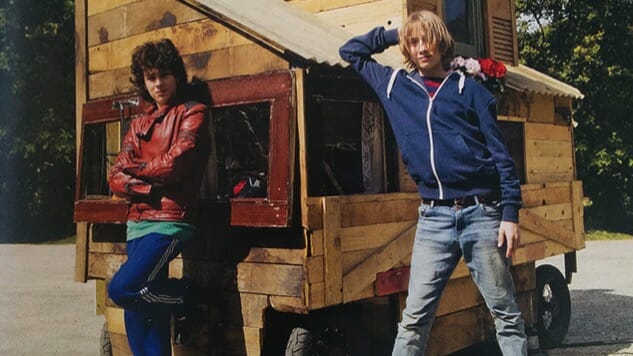Microbe & Gasoline

How do you nurture a child, and how do you encourage an artist? Microbe & Gasoline is a film that offers up a somewhat terrifying answer (for parents, at least) to both questions: freedom. In theory, it’s a bad idea to let your child build a “car” with his buddy, and take that car out on the open road for the adventure of a lifetime. But like so many other iconic films about childhood adventures (Moonrise Kingdom, Ferris Beuller’s Day Off), Michel Gondry’s latest insists that the life of a child, especially a budding artist, is incomplete without those dangers parents are so often told to fear—those adventures kids must so often have behind our backs.
Microbe & Gasoline is a portrait of the artists as young men, as complex as a James Joyce novel, and as delightful as Gondry’s other achievements, including Be Kind Rewind and Eternal Sunshine of the Spotless Mind. And even while treading in familiar waters with its overarching plot, this beautiful film accomplishes what seldom few stories can by presenting a tale of youth and friendship and amplifying simple themes so that the result is a powerful treatise on art, creation, intellect and genius.
Gondry’s story poses first as one focused on childhood bullies and classroom outcasts. Ange Dargent plays Daniel (dubbed “Microbe” by his fellow classmates for his minuscule build), the kind of kid talented enough to get his own small gallery showing, but from a family where there are enough distractions that nobody bothers to go see it. He begins finding solace in the new kid at school, Théo (played by Théophile Baquet), who’s good with his hands, rocks a leather jacket, rides a motorbike and is so adept at building and fixing things that he’s granted the nickname “Gasoline.” In Théo, Daniel finds his first true friend, creative partner and collaborator: the first person to support (and challenge) his art.
Microbe & Gasoline steps into grander territory when it uses this friendship as vessel to pose bigger questions: “Are you easily influenced, and does this make you less of an artist?” or “How do you know if you’re a creative genius, or just often in the company of one—the friend of the great one, but not so great yourself?” According to our two adolescent heroes, it’s never too early to start asking. And their interactions, performed beautifully by Dargent and Baquet, work to negate the commonly held and reinforced belief that young people are immature and frivolous. Even as Daniel and Théo are true to their age—not above fart jokes and obsessed with their appearances (the film embraces all this)—these characters are presented through a lens and a narrative that is sincerely interested in their art and intellect, their pain and their pleasures.
-

-

-

-

-

-

-

-

-

-

-

-

-

-

-

-

-

-

-

-

-

-

-

-

-

-

-

-

-

-

-

-

-

-

-

-

-

-

-

-








































